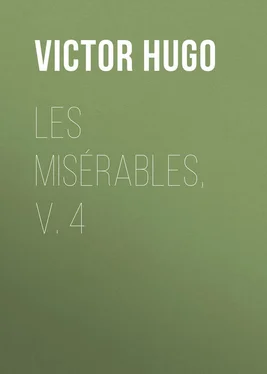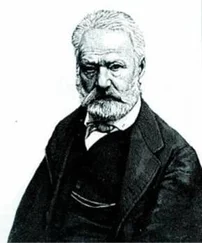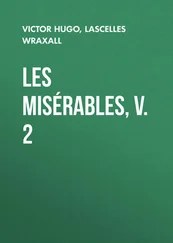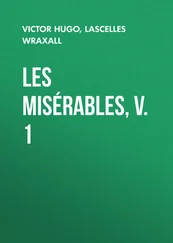Victor Hugo - Les Misérables, v. 4
Здесь есть возможность читать онлайн «Victor Hugo - Les Misérables, v. 4» — ознакомительный отрывок электронной книги совершенно бесплатно, а после прочтения отрывка купить полную версию. В некоторых случаях можно слушать аудио, скачать через торрент в формате fb2 и присутствует краткое содержание. Жанр: literature_19, foreign_antique, foreign_prose, на английском языке. Описание произведения, (предисловие) а так же отзывы посетителей доступны на портале библиотеки ЛибКат.
- Название:Les Misérables, v. 4
- Автор:
- Жанр:
- Год:неизвестен
- ISBN:нет данных
- Рейтинг книги:4 / 5. Голосов: 1
-
Избранное:Добавить в избранное
- Отзывы:
-
Ваша оценка:
- 80
- 1
- 2
- 3
- 4
- 5
Les Misérables, v. 4: краткое содержание, описание и аннотация
Предлагаем к чтению аннотацию, описание, краткое содержание или предисловие (зависит от того, что написал сам автор книги «Les Misérables, v. 4»). Если вы не нашли необходимую информацию о книге — напишите в комментариях, мы постараемся отыскать её.
Les Misérables, v. 4 — читать онлайн ознакомительный отрывок
Ниже представлен текст книги, разбитый по страницам. Система сохранения места последней прочитанной страницы, позволяет с удобством читать онлайн бесплатно книгу «Les Misérables, v. 4», без необходимости каждый раз заново искать на чём Вы остановились. Поставьте закладку, и сможете в любой момент перейти на страницу, на которой закончили чтение.
Интервал:
Закладка:
"Ah, here he is!"
He raised his eyes and recognized the unhappy girl who had come to him one morning, Éponine, the elder of Thénardier's daughters; he now knew what her name was. Strange to say, she had grown poorer and more beautiful, two things which he had not thought possible. She had accomplished a double progress, toward light and toward distress. Her feet were bare and her clothes torn, as on the day when she so boldly entered his room, but the tatters were two months older, the holes larger, and the rags filthier. She had the same hoarse voice, the same forehead wrinkled and bronzed by exposure, the same free, absent, and wandering look, but she had, in addition, on her countenance, something startled and lamentable, which passing through prisons adds to misery. She had pieces of straw and hay in her hair, not that, like Ophelia, she had gone mad through contagion with Hamlet's lunacy, but because she had slept in some stable-loft.
And with all that she was beautiful. What a star thou art, O youth!
She had stopped in front of Marius with a little joy on her livid face, and something like a smile, and it was some minutes ere she could speak.
"I have found you!" she said at last. "Father Mabœuf was right, it was in this boulevard! How I have sought you, if you only knew! Do you know that I have been in quod for a fortnight? They let me go as there was no charge against me, and besides I had not attained years of discretion by two months. Oh, how I have looked for you the last six weeks! So you no longer live down there?"
"No," said Marius.
"Ah, I understand, on account of that thing; well, such disturbances are unpleasant, and you moved. Hilloh, why do you wear an old hat like that? A young man like you ought to be handsomely dressed. Do you know, Monsieur Marius, that M. Mabœuf calls you Baron Marius, – I forget what, but you are not a Baron, are you? Barons are old swells, who walk in front of the Luxembourg Palace, where there is the most sun, and read the Quotidienne for a sou. I went once with a letter for a Baron who was like that, and more than a hundred years of age. Tell me, where do you live now?"
Marius did not answer.
"Ah," she added, "you have a hole in your shirt-front, I must mend it for you."
Then she continued with an expression which gradually grew gloomier, —
"You do not seem pleased to see me?"
Marius held his tongue. She was also silent for a moment, and then exclaimed, —
"If I liked, I could compel you to look pleased."
"What do you mean?" Marius asked.
She bit her lip, and apparently hesitated, as if suffering from some internal struggle. At length she seemed to make up her mind.
"All the worse, but no matter, you look sad and I wish you to be pleased, only promise me, though, that you will laugh, for I want to see you laugh and hear you say, 'Ah! that is famous!' Poor Monsieur Marius! you know you promised you would give me all I wanted."
"Yes, but speak, can't you?"
She looked at Marius intently and said, "I have the address."
Marius turned pale, and all his blood flowed to his heart.
"What address?"
"The address which you asked me for;" and she added, as if with a great effort, "the address, – you surely understand?"
"Yes," stammered Marius.
"The young lady's."
These words uttered, she heaved a deep sigh. Marius leaped from the parapet on which he was sitting, and wildly seized her hand.
"Oh, lead me to it! Tell me! Ask of me what you please! Where is it?"
"Come with me," she answered; "I don't exactly know the street or the number, and it is quite on the other side of town; but I know the house well, and will take you to it."
She withdrew her hand, and continued in a tone which would have made an observer's heart bleed, but did not at all affect the intoxicated and transported lover, —
"Oh, how pleased you are!"
A cloud passed over Marius's forehead, and he clutched Éponine's arm.
"Swear one thing."
"Swear?" she said. "What do you mean by that? Indeed, you want me to swear?"
And she burst into a laugh.
"Your father! Promise me, Éponine, – swear to me that you will never tell your father that address."
She turned to him with an air of stupefaction. "Éponine! how do you know that is my name?"
"Promise me what I ask you."
But she did not seem to hear him.
"That is nice! You called me Éponine!"
Marius seized both her arms.
"Answer me in Heaven's name! Pay attention to what I am saying, – swear to me that you will not tell your father the address which you know."
"My father?" she remarked, "oh, yes, my father. He's all right in a secret cell. Besides, what do I care for my father?"
"But you have not promised!" Marius exclaimed.
"Let me go!" she said, as she burst into a laugh; "how you are shaking me! Yes, yes, I promise it; I swear it! How does it concern me? I will not tell my father the address. There, does that suit you; is that it?"
"And no one else?" said Marius.
"And no one else."
"Now," Marius continued, "lead me there."
"At once?"
"Yes."
"Come on! Oh, how glad he is!" she said.
A few yards farther on she stopped.
"You are following me too closely, Monsieur Marius; let me go on in front and do you follow me, as if you were not doing so. A respectable young man like you must not be seen with such a woman as I am."
No language could render all that was contained in the word "woman," thus pronounced by this child. She went a dozen paces and stopped again. Marius rejoined her, and she said to him aside without turning to him, —
"By the bye, you know that you promised me something?"
Marius felt in his pocket; he had nothing in the world but the five-franc piece destined for Father Thénardier, but he laid the coin in Éponine's hand. She let it slip through her fingers on the ground, and looking at him frowningly said, —
"I do not want your money."
BOOK III
THE HOUSE OF THE RUE PLUMET
CHAPTER I
THE MYSTERIOUS HOUSE
About the middle of the last century a president of the Parliament of Paris who kept a mistress under the rose – for at that day the nobility displayed their mistresses and the bourgeois concealed theirs – had "une petite maison" built in the Faubourg St. Germain, in the deserted Rue Blomet, which is now called Rue Plumet, and not far from the spot which was formerly known as the "Combat des Animaux." This house consisted of a pavilion only one story in height, there were two sitting-rooms on the ground-floor, two bedrooms on the first, a kitchen below, a boudoir above, an attic beneath the roof, and the whole was surrounded by a large garden with railings looking out on the street. This was all that passers-by could see. But behind the pavilion was a narrow yard, with an outhouse containing two rooms, where a nurse and a child could be concealed if necessary. In the back of this outhouse was a secret door leading into a long, paved, winding passage, open to the sky, and bordered by two lofty walls. This passage, concealed with prodigious art, and, as it were, lost between the garden walls, whose every turn and winding it followed, led to another secret door, which opened about a quarter of a mile off almost in another quarter, at the solitary end of the Rue de Babylone. The president went in by this door, so that even those who might have watched him, and observed that he mysteriously went somewhere every day, could not have suspected that going to the Rue de Babylone was going to the Rue Blomet. By clever purchases of ground, the ingenious magistrate had been enabled to make this hidden road upon his own land, and consequently uncontrolled. At a later date he sold the land bordering the passage in small lots for gardens, and the owners of these gardens on either side believed that they had a parting-wall before them, and did not even suspect the existence of this long strip of pavement winding between two walls among their flower-beds and orchards. The birds alone saw this curiosity, and it is probable that the linnets and tomtits of the last century gossiped a good deal about the President.
Читать дальшеИнтервал:
Закладка:
Похожие книги на «Les Misérables, v. 4»
Представляем Вашему вниманию похожие книги на «Les Misérables, v. 4» списком для выбора. Мы отобрали схожую по названию и смыслу литературу в надежде предоставить читателям больше вариантов отыскать новые, интересные, ещё непрочитанные произведения.
Обсуждение, отзывы о книге «Les Misérables, v. 4» и просто собственные мнения читателей. Оставьте ваши комментарии, напишите, что Вы думаете о произведении, его смысле или главных героях. Укажите что конкретно понравилось, а что нет, и почему Вы так считаете.












